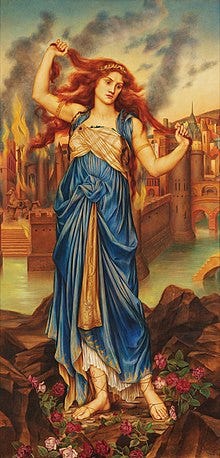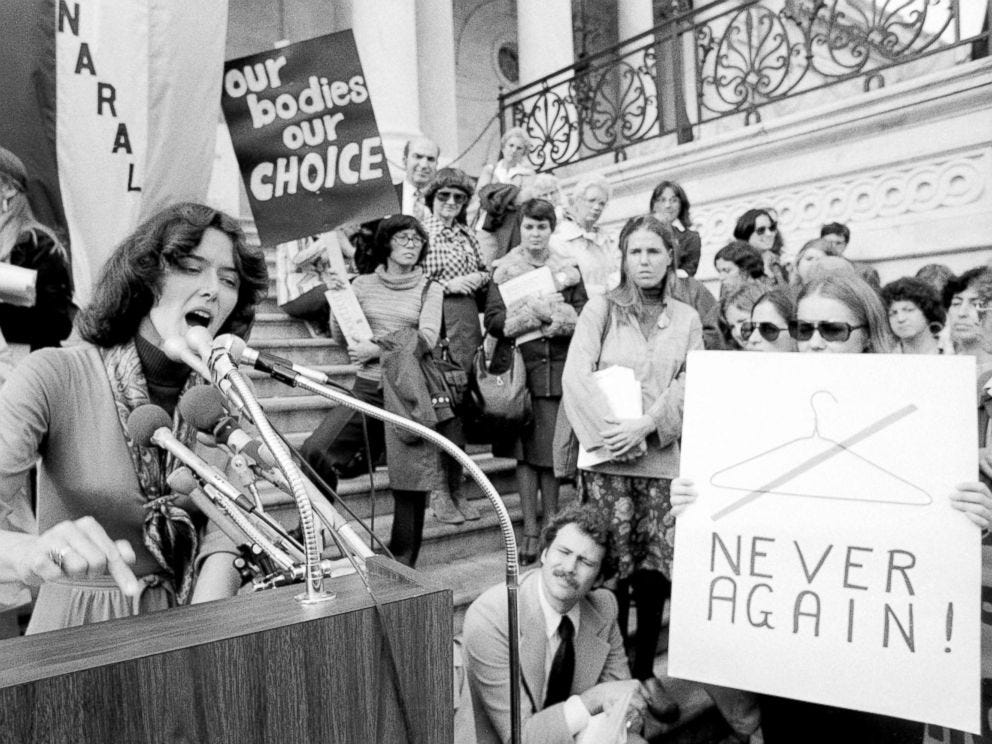~ This post will be talking about the recent mass shootings in both buffalo and uvalde. While I don’t go into any graphic detail, please skip if you need.
I have also linked organizations in need of donations at the bottom of this newsletter if you feel so inclined. ~
*
Cassandra’s name has been invoked a lot in recent years.
She’s a figure from Greek mythology, specifically a Trojan priestess. When Cassandra spurned the advances of the god Apollo, who had promised her the ability to see the future, he twisted her newfound power into a curse: she could see the future, yet no one would believe her prophecies. Despite speaking the truth, she was damned to be dismissed and sidelined forever.
Cassandra warned those around her that their home, Troy, would be destroyed. But not a single person believed her. So she witnessed her worst nightmare come true in real time as the city burned to the ground.
This is every anxious person’s idea of true hell: one misstep against a person in power and you’re doomed to watch everything you love and worked hard to build be mercilessly burned to the ground.
Most recently, Cassandra’s name has been brought up in the midst of Dr. Christine Blasey Ford’s Senate Committee testimony against human-keg-stand-turned-Justice Brett Cavanaugh; she’s been invoked as climate change headlines and studies grow increasingly dire; as the right to gender-affirming medical care for trans children and their families has been stripped away; and this past month Cassandra has been invoked as Roe v. Wade has finally been meaningfully challenged (and will likely be overturned). And she’s been an unnamed presence as two mass shootings—the victims of which were mostly people of color—rocked both Buffalo, New York and Uvalde, Texas.
To be a Cassandra is to be the prophet no one wants to believe—you come bearing the bad news no one wants to hear. You see where something’s going and want to warn others who cannot see danger looming. One could argue Cassandra was repeatedly gaslit (although gaslighting is a term so often misused online that I hesitate to dive into it here).
And lately I sure feel like a Cassandra.
I know I’m far from alone. All of the horrific news of this past month in particular is entirely, miserably predictable. I’m not here to argue that I, Sarah, am the only Cassandra out here. But I have been screaming to anyone who will listen—namely the inboxes and voicemail boxes of legislators who in theory are supposed to have power—that abortion rights are in danger and school shootings will continue for years, particularly after 2016 when Trump took office.
I’ve been worried about these issues for years and years now—What will I do if they outlaw abortion? What happens if I miscarry or lose a pregnancy one day? If I do have a child, how will I know if they are safe at school? What would I do if a shooter entered my classroom? Or if one of my own students pulled out a gun? Where are the blind spots, the light switches, the best hiding spots in my classroom?—so much so that it just feels intrinsic to my own everyday anxiety, as depressing as that sounds.
For years though, this kind of anxiety about the potential restriction of our rights has been called “alarmist.” Surely marriage equality, abortion, trans healthcare, and proposed gun reform measures won’t be completely dismantled. Certainly there are “good guys” who will prevent the worst from happening and protect us.
Anxiety is oftentimes touted as a “good” thing, and it can be. Since anxiety and panic are offshoots of our animalistic “fight-or-flight” instincts, they are meant to keep us out of danger. They are a way in which we can save ourselves.
Here’s the thing: folks who have called me and other anxious folks like me “alarmist” use “alarmism” as an insult. But everyone, no matter where you live on the political spectrum, is anxious and afraid of something, usually rightfully so. But the definition of the word “alarmist” does, indeed, mean someone who is blowing a problem out of proportion. In other words: your fear is encroaching on my fear and is therefore inconvenient to my reality, so fuck you.
To see a possible dangerous future is a punishment as you watch the rights you have over your body slowly eroded away. You repeatedly watch innocent children and schoolteachers and service workers and grandparents slaughtered in public spaces, just as you knew they would and as you said they would if nothing changed.
So what do we call someone who fears for the future for valid reasons? There’s really only one term: Cassandra. And a Cassandra is destined to never, ever be believed.
Could there a term for someone anxious and who has a right to feel that way? “Concerned citizen” doesn’t seems intense enough to describe the genuine fear and panic and grief the news has brought this week—or hell, these past two years.
Concern is what I feel when I’m not sure whether or not to take a cake out of the oven yet. Concern is figuring out if I ought to take an umbrella with me when the weather forecast is unclear. Concern is wondering if a subway dancer is going to possibly kick me in the face as I ride the Q train over the Manhattan Bridge.
Concern isn’t life-or-death decision-making—it’s small-time apprehension that’s still a true emotion, but not nearly as saturating and all-encompassing as this particular kind of nervous existence so many of us have found ourselves in.
Is there a space between an alarmist, a concerned citizen, and a “Cassandra”? If there is, what should we call it?
Because I’m over being called an alarmist when every fear I’ve had has come to fruition (and then some). And my remaining fears seem hellbent on coming true one way or another, whether I like it or not.
*
Just writing and talking about our anxiety is not enough to make meaningful change.
If you enjoy the newsletter at all and you have the means, please consider donating to the following organizations who are doing incredible work on the ground for those most in need:







